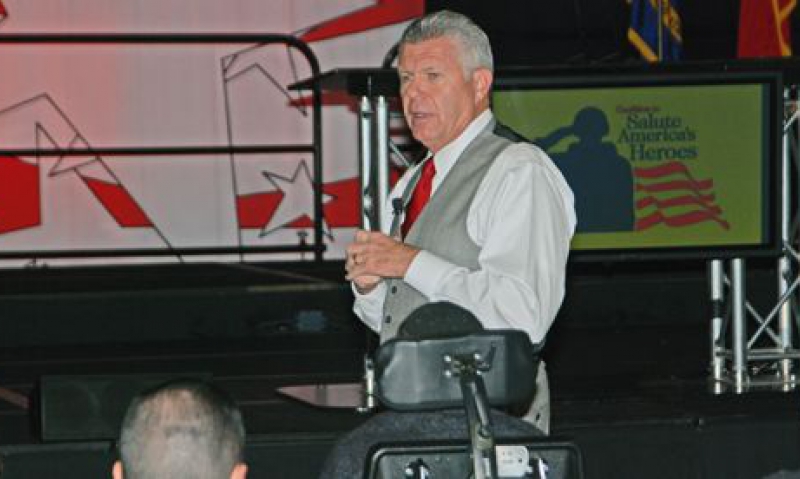
Former undercover New Jersey State Trooper shares his PTS experiences, encourages peer counseling during Road to Recovery.
In his 20 years as a National Basketball Association referee, Bob Delaney has been jeered, called names and had his eyesight questioned in the most imaginative of ways. But it was his experiences as a New Jersey State Trooper – including an undercover assignment in which he infiltrated organized crime – that Delaney shared with a packed room of Iraq and Afghanistan veterans during Tuesday’s general session of the Road to Recovery in Orlando.
Delaney spoke openly about the post-traumatic stress that he developed from living a double life and witnessing death up close. “I was good at repressing normal reactions to fear,” Delaney said. “Because I was part of the New Jersey State Police, because I went through pre-service training – like the uniform that you wear – we like to think that those uniforms allow us to leap tall buildings in a single bound and think we can handle anything. The reality is that we are human. Even though I couldn’t tell another trooper that I was afraid, there were tremendous amounts and levels of fear inside me.
“I’d wake up in the middle of the night and you’d think I’d urinated the bed. I was soaked from head to toe. That was a normal reaction to the fear that was coming out when I was in a relaxed state.”
Delaney said that at first he thought his reaction was experienced only by those doing undercover work. He later found out that other police officers experienced the same reactions. Later, at the site of a fatal motorcycle accident, Delaney said he had to hide the fact he was shaking, and later he “cried his eyes out” in the police station bathroom. “Every time I tell that story, a cop will come around and tell me they went through the same thing,” Delaney said. “We like to repress. We like to push things down. Folks, it’s going to come out somehow, someway.”
Delaney compared PTS to air in a balloon that “needs to come out. There are things that you in this room have experienced that you need to speak of,” he said. “I am a big believer in peer-to-peer (help).”
Delaney said he realized the cause of his reactions only after he spoke with his college psychology professor. “The more and more that we did informal therapy, he’s the one who came out and said, ‘Bob, you’re going through post-traumatic stress,’” Delaney said. “I was in denial. I said, ‘Hey, that’s what guys coming back from Vietnam have. I don’t have that.’”
Delaney said he also found relief in forming a relationship with Joe Pistone, the undercover agent portrayed by Johnny Depp in the film “Donnie Brasco.” Delaney’s friend from the FBI introduced the two.
“(Pistone) was someone I could speak to who was going through or had gone through a similar experience that I did,” Delaney said. “When we speak of peer-to-peer therapy, what we’re saying is that you need to speak with someone who goes through a similar experience. It’s not the same experience – your experience is your experience. It’s a similar experience. They can relate to what you’re speaking about. “
Delaney spoke of a growing paranoia that the mob was closing in around him and compared it to the PTS experienced by returning servicemembers. “It is not something that is a movie. It’s not something that’s make believe,” he said. “These are real, sincere thoughts of the people that are experiencing them. It doesn’t mean you’re crazy. It doesn’t mean that you’re nuts. What it means is that you’ve experienced something, and you’re having a normal reaction to an abnormal situation.”
Delaney closed his presentation by thanking the audience, using a quote from legendary UCLA basketball coach John Wooden. “‘You do not realize a full life until you do something for someone who will never be able to repay you,’” Delaney quoted Wooden. “Every one of you in this room lives a full life, and on behalf of all Americans that cannot say thank you to you, I salute you.”
- Veterans Benefits

